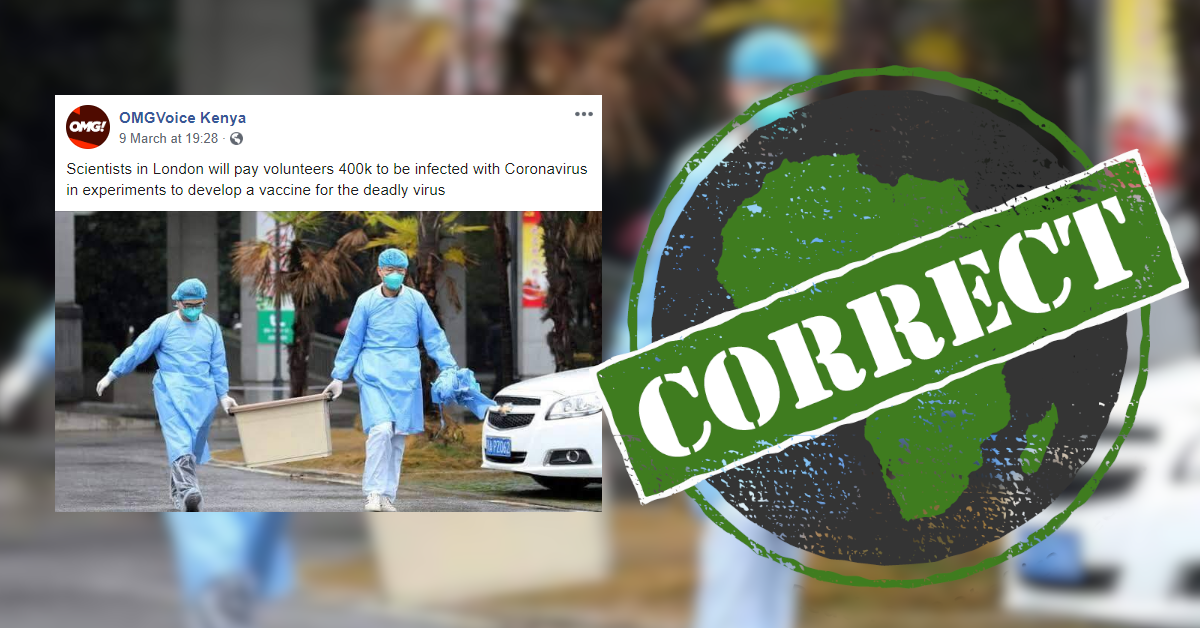“Scientists in London will pay volunteers 400k to be infected with Coronavirus in experiments to develop a vaccine for the deadly virus,” claims a post on a Kenyan Facebook page.
On 11 March 2020 the World Health Organization declared the new coronavirus disease, Covid-19, a pandemic – a serious outbreak in many countries.
By 23 March there were nearly 340,000 confirmed cases of coronavirus infection across the world, with close on 15,000 deaths. About 100,000 people have recovered from Covid-19.
Urgent efforts to fight the coronavirus include the development of vaccines and a number of drugs as potential treatments.
But are scientists offering to pay people to be infected with coronavirus?

Coronaviruses are a family of viruses that can cause mild to serious diseases, from the common cold to severe acute respiratory syndrome. The new coronavirus, identified in December 2019 and named SARS-CoV-2, causes the disease Covid-19.
The story of people being recruited for infection with coronaviruses has been reported widely in the British and global press. According to the UK Sunday Times, a company called hVIVO is offering to pay volunteers to be infected with a strain of coronavirus.
According to a 9 March press release from the London Stock Exchange, OpenOrphan, hVIVO’s parent company, said it “will utilise common coronavirus strains such as OC43 and 229E which are from the same family of viruses as the newly emerging Covid-19 virus but unlike Covid-19 these common coronaviruses have been widespread in the community for many years and cause only a mild cold-like respiratory illness”.
Volunteers can register for hVIVO’s study at Flucamp.com. On its website, the company explains that it is not looking to study the new coronavirus that causes Covid-19, but other, more common coronaviruses.
“Flucamp is not recruiting volunteers for studies on Coronavirus at the moment,” it says.
“This is a line of research we are looking into – not with Covid-19 but with a safer, milder coronavirus which has been circulating in people for a long time – and we’ll make announcements when we’re ready to start.” – Vincent Ng’ethe
On 11 March 2020 the World Health Organization declared the new coronavirus disease, Covid-19, a pandemic – a serious outbreak in many countries.
By 23 March there were nearly 340,000 confirmed cases of coronavirus infection across the world, with close on 15,000 deaths. About 100,000 people have recovered from Covid-19.
Urgent efforts to fight the coronavirus include the development of vaccines and a number of drugs as potential treatments.
But are scientists offering to pay people to be infected with coronavirus?

Family of viruses
Coronaviruses are a family of viruses that can cause mild to serious diseases, from the common cold to severe acute respiratory syndrome. The new coronavirus, identified in December 2019 and named SARS-CoV-2, causes the disease Covid-19.
The story of people being recruited for infection with coronaviruses has been reported widely in the British and global press. According to the UK Sunday Times, a company called hVIVO is offering to pay volunteers to be infected with a strain of coronavirus.
According to a 9 March press release from the London Stock Exchange, OpenOrphan, hVIVO’s parent company, said it “will utilise common coronavirus strains such as OC43 and 229E which are from the same family of viruses as the newly emerging Covid-19 virus but unlike Covid-19 these common coronaviruses have been widespread in the community for many years and cause only a mild cold-like respiratory illness”.
Volunteers can register for hVIVO’s study at Flucamp.com. On its website, the company explains that it is not looking to study the new coronavirus that causes Covid-19, but other, more common coronaviruses.
“Flucamp is not recruiting volunteers for studies on Coronavirus at the moment,” it says.
“This is a line of research we are looking into – not with Covid-19 but with a safer, milder coronavirus which has been circulating in people for a long time – and we’ll make announcements when we’re ready to start.” – Vincent Ng’ethe
Republish our content for free
For publishers: what to do if your post is rated false
A fact-checker has rated your Facebook or Instagram post as “false”, “altered”, “partly false” or “missing context”. This could have serious consequences. What do you do?
Click on our guide for the steps you should follow.
Publishers guideAfrica Check teams up with Facebook
Africa Check is a partner in Meta's third-party fact-checking programme to help stop the spread of false information on social media.
The content we rate as “false” will be downgraded on Facebook and Instagram. This means fewer people will see it.
You can also help identify false information on Facebook. This guide explains how.


Add new comment